In 2016, Governor Brown signed Senate Bill 1383 into California law, establishing statewide greenhouse gas emission reduction goals:
This law expands upon the requirements of AB 341: Mandatory Commercial Recycling and AB 1826: Mandatory Commercial Organics. However, SB 1383 is unique in that it impacts residents in addition to businesses, and it requires some businesses to donate excess edible food to feed people in addition to diverting organic materials from the garbage. As the most aggressive waste reduction law to be adopted in California for the past 30 years, SB 1383 includes significant penalties for non-compliance.
Organic materials, sometimes called organics or organic waste, mean solid wastes containing material originated from living organisms and their metabolic waste products. Some examples include:
Organic materials should be separated from the garbage and placed in a green bin that is serviced by a franchised hauling company. Alternatively, you may choose to self-haul to a permitted facility. All organic materials collected in Sonoma County are composted.
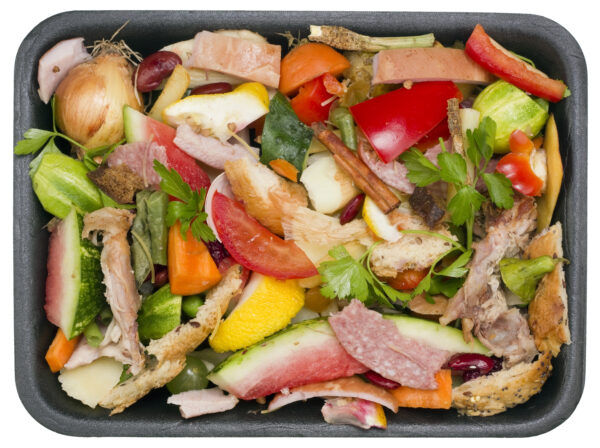
Contact us or your hauling company to request indoor containers, posters, labels, and stickers at no extra cost. Staff are available to provide training or host workshops for your employees or tenants, to teach them how to properly sort their waste and prevent contamination.
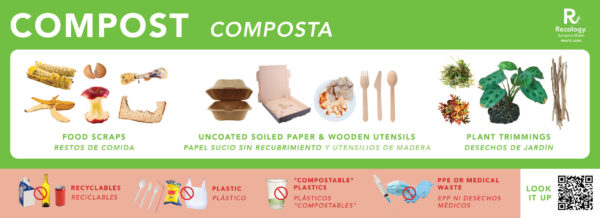
Tier One Commercial Entities are required to comply with excess food donation requirements starting Jan 1, 2022 while Tier Two Commercial Entities are required to comply starting Jan 1, 2024.
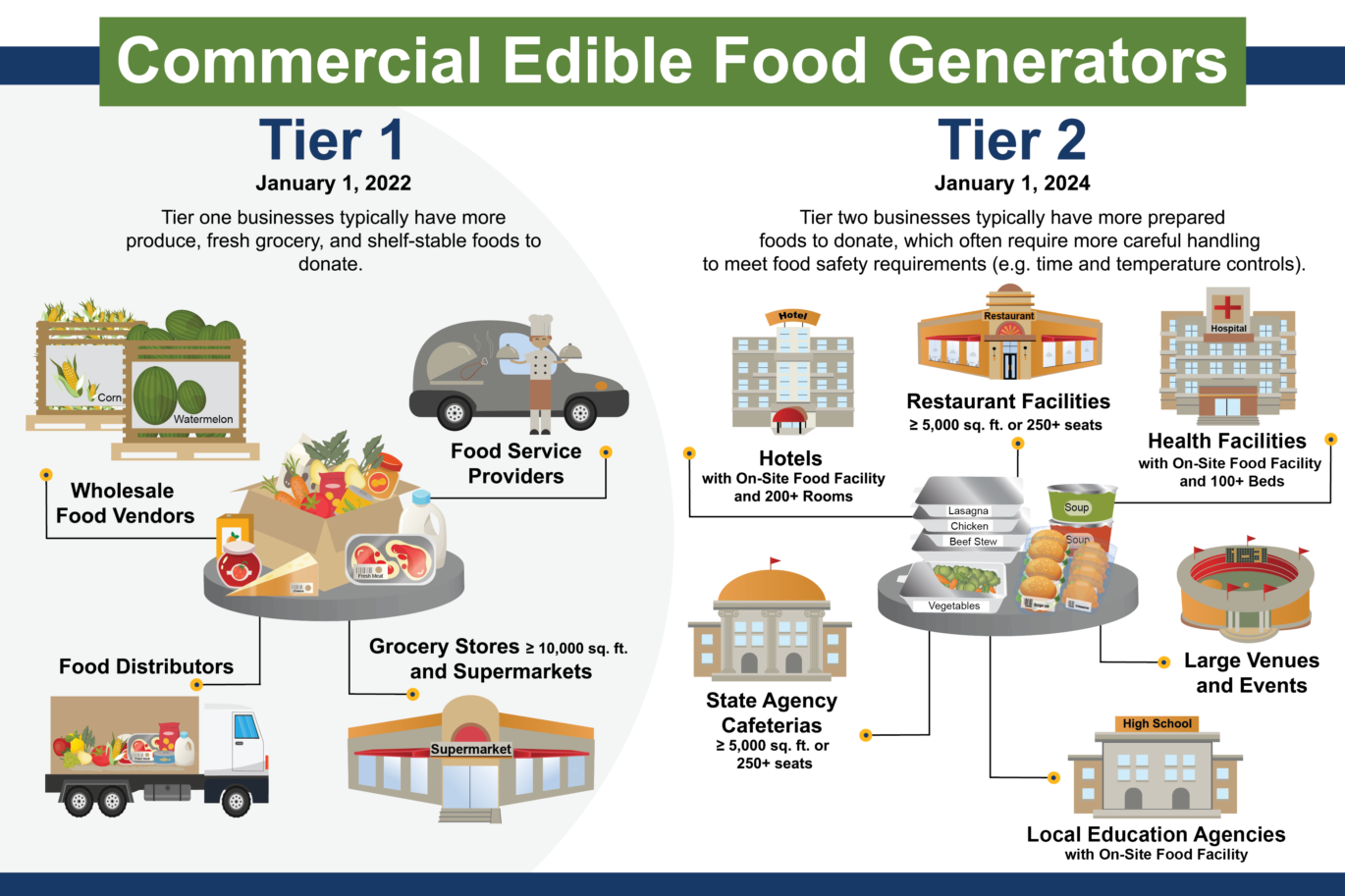
Only donate quality foods that are still good to eat, and that you would give a neighbor or close friend. Unusual shapes or sizes are okay, but no rotten or half-eaten foods. Foods that are past the "best by" date may be okay, but please make sure the food is still safe to eat before donating by following safe food handling practices (below).
Do not donate foods that are rotten, half-eaten, or have their packaging opened or damaged. Please limit donation of foods that are low in nutrition.
When donating food, please make sure to follow safe food handling practices.
Please refer to the Sonoma County Environmental Health Department for more information and resources.
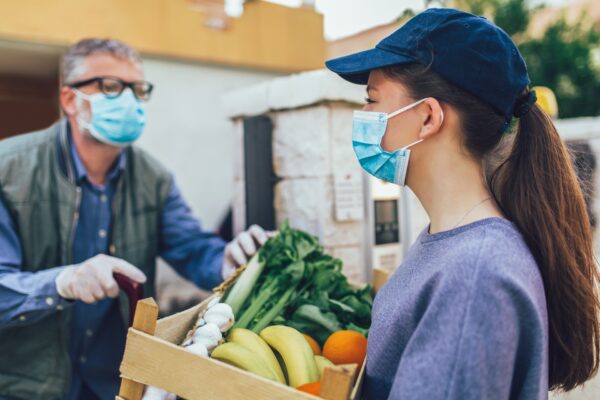
Zero Waste Sonoma has compiled a list of local Food Recovery Organizations and Services that provide edible food recovery in Sonoma County. Please note that if you are a Tier 1 or Tier 2 Edible Food Generator, you need to have a written agreement with a Food Recovery Organization or Service in order to comply with SB 1383.
Businesses, schools, and other organizations with excess or surplus food are encouraged to donate food and feed people who may be food insecure. Zero Waste Sonoma (ZWS) and Conservation Corps North Bay (CCNB) are pleased to offer free food pick-up services through grants with CalRecycle and CalVolunteers. Please contact Kristen Sales kristen.sales@sonoma-county.org and Kyle LaRue klarue@ccnorthbay.org for more info and to sign up.
In addition, ZWS has purchased a license with Careit for a food donation software, which helps connect food donors with food recipient/distribution organizations. The software makes it easy for restaurants, grocery stores, schools, and other food donors to post surplus food, and nearby non-profit organizations are notified of the food available for pick up. Sign up to donate or receive food at https://careitapp.com/
The state agency CalRecycle developed a Model Food Recovery and Donation Agreement, which may help define the services and expectations between commercial Tier I and II food donors and food recipient/distribution organizations.
Federal and state civil and criminal liability protections are in place for both food donors and nonprofit organizations who receive or distribute food donations to those in need.
1. California Good Samaritan Act (AB 1219 2017)
2. California Code Section 114433
3. Federal Bill Emerson Good Samaritan Food Donation Act (1996)
Food date labels are an attempt to indicate quality of food, but not safety. In fact, the only federal regulation for date labeling of products is for infant formula. Most food products are still safe to eat past the date labeled on the product.
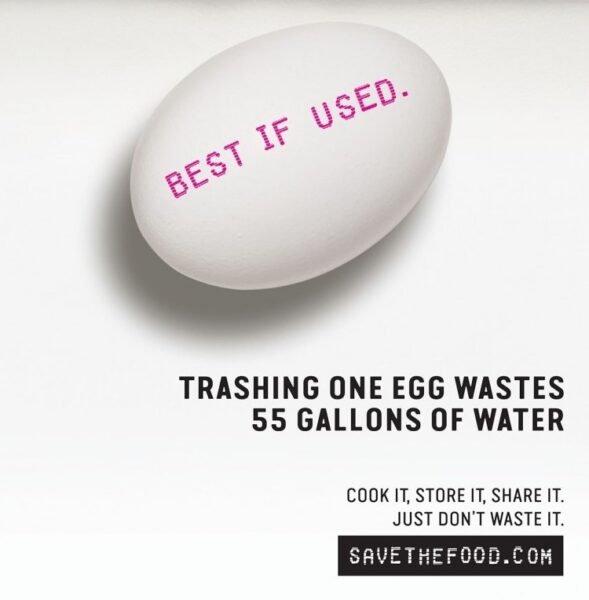
Credit: NRDC and the Ad Council
Commercial businesses and entities may be waived from the organics collection and/or food recovery requirements of SB 1383 for the following reasons.
De Minimis
Space Constraints
There is not enough space on the premises to store dumpsters/carts/bins for all three waste streams (garbage, recycling, and organics). Photo evidence must be submitted to ZWS-SB1383@sonomacounty.gov before the waiver will be approved.
SB 1383 Regulations require that Zero Waste Sonoma make a publicly available Complaint Investigation portal for residents to report businesses that violate any aspect of SB 1383 Regulations. If you observe a regulated business in Sonoma County not complying with SB 1383, please fill out the form below to file a complaint.